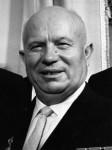
The death of Joseph Stalin in 1953 ended a quarter-century of his dictatorial rule over the Soviet Union. It also led to great uncertainty about who would lead the world’s communist superpower. Always paranoid about plots and coups, Stalin had refused to nominate or prepare a successor: he operated with no deputy, no right-hand man and no protégé. Because of this, Stalin’s death left the Soviet Union leaderless. This triggered a power struggle between several members of the Communist Party Politburo. Georgy Malenkov, who was named both premier and party chief after Stalin’s death, seemed the logical successor. Many in the Soviet hierarchy, fearing Malenkov would become as autocratic and brutal as Stalin, moved against him. While Malenkov retained the premiership, he was stripped of the Communist Party leadership. It was handed to Nikita Khrushchev. In time, Khrushchev became the most powerful figure in the Soviet Union.
Khrushchev had been a member of Stalin’s inner circle in the early 1930s (records suggest he was a regular attendant at high-level meetings and at Stalin’s private residence for dinners). Khrushchev admired the dictator – though like other party members he was intimidated by and wary of Stalin. Khrushchev gave tacit support to Stalin’s murderous purges during the mid-1930s. He became party leader in Ukraine and, in 1939, a member of the Soviet Politburo (ministry). Khrushchev served during the war against Nazi Germany as a party commissar; like many Russians of his age, he lost a son in this conflict. He returned to Ukraine after the war, where he oversaw the continued collectivisation of farms. In 1949 Khrushchev was recalled to Moscow – probably because Stalin, fearing a conspiracy against his leadership, wanted to surround himself with loyal acolytes. After Stalin’s death in 1953 Khrushchev engaged in a power struggle with other members of the Politburo. By 1955 he had become the most powerful figure in the Soviet government, dispensing with secret police head Lavrenti Beria and elbowing out premier Malenkov.
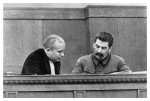
One of Khrushchev’s best-known acts was his ‘Secret Speech‘, delivered to the Communist Party’s 20th annual congress in February 1956. In this speech, Khrushchev denounced many aspects of the Stalinist era and urged a return to the original principles of Lenin. The new Soviet leader attacked the personality cult employed by Stalin; the lack of consultation and collective decision-making during his reign; Stalin’s attacks on leading Bolsheviks; the victimisation of nationalist groups and Stalin’s paranoia about plots and conspiracies. Above all, Khrushchev condemned Stalin’s systematic use of murder and intimidation, targetting those who disagreed with his policies:
“We have to consider seriously and analyse correctly [the crimes of the Stalin era] in order that we may prevent any possibility of a repetition in any form… Stalin acted not through persuasion, explanation, and patient cooperation with people, but by imposing his concepts and demanding absolute submission to his opinion. Whoever opposed this concept or tried to prove his viewpoint … was doomed to removal from the leading collective and to subsequent moral and physical annihilation. This was especially true during the period following the XVIIth Party Congress [1934], when many prominent Party leaders and rank-and-file Party workers, honest and dedicated to the cause of Communism, fell victim to Stalin’s despotism … Stalin originated the concept ‘enemy of the people’. This term made possible the usage of the most cruel repression, violating all norms of revolutionary legality, against anyone who in any way disagreed with Stalin.”
The contents of this speech were delivered in closed session (hence the name ‘Secret Speech’) and not released until after the Cold War. News of Khrushchev’s denunciation filtered out of the Congress, however, circulating around Russia, the Soviet bloc and beyond. The speech caused a sensation (several party members aligned with Stalin committed suicide after hearing it) and heralded the beginning of more relaxed policies in the USSR. For a brief period, it seemed as though Khrushchev might be a more open, liberal leader, someone whom the West could deal with. Within months, however, Soviet forces had crossed the border and crushed the Hungarian Uprising. In November 1956 Khrushchev employed belligerent and threatening Cold War rhetoric, delivering his famous “we will bury you” threat to foreign ambassadors in Moscow.
“Do you want to know just who I am? I started to work as soon as I began to walk. Until I was 15, I tended young calves, I tended sheep and then I tended a land lord’s cattle. Then I worked at a factory, the owners of which were Germans. After that, I worked in mines which belonged to Frenchmen. I worked in chemical factories belonging to Belgians. And now I am the prime minister of the great Soviet Russian state!”
Nikita Khrushchev
Despite this, Khrushchev’s public image in the West and his relationship with Western politicians was significantly better than Stalin’s. His ‘kitchen debate‘ with Richard Nixon exposed Khrushchev as an aggressive defender of communism – but he was also a man of some humour who was at least willing to meet and communicate. Khrushchev accepted an invitation from Nixon to visit the United States, undertaking the first visit by a Soviet leader in late 1959. Khrushchev spent two weeks touring major American cities and some rural areas. He was pursued across the US by a media circus, eager to capture a controversial remark from the Soviet leader, though Khrushchev rarely indulged them. US-Soviet relations soured again in 1960 during the U-2 spy plane crisis. Later that year Khrushchev delivered an agitated speech to the United Nations general assembly, ranting about US aggression before taking off one of his shoes and pounding it against the lectern. The Western media, already cultivating an image of Khrushchev as an unrestrained bully who might start a war in a fit of bad temper, seized on this incident.
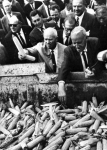
Domestically, Khrushchev introduced policies and initiatives that brought improvements in some areas and failures in others. Economically, he attempted to decentralise industry and manufacturing by relaxing national quotas and establishing regional economic councils. Khrushchev also sought to avoid the disastrous famines caused by Stalin’s collectivisation. Soviet farmers were given greater freedom to grow their own produce, while payments for crops requisitioned by the state were increased. Khrushchev also planned to increase food output by cultivating almost 150,000 square kilometres of untouched land in Siberia, Kazakhstan and the Caucasus (the ‘Virgin Lands Campaign’). These measures increased the availability of food and consumer goods, though they also caused prices to rise. Khrushchev’s policies did raise living standards in many parts of Russia, however, the outcomes were inconsistent and often failed to meet targets. Khrushchev also wound back Stalinist systems of control and oppression, though the state still engaged in limited censorship and retained control of the press.
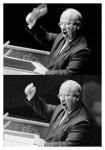
Khrushchev’s leadership lasted until 1964. In the early 1960s, he was confronted with new challenges in the Soviet bloc and new American leadership. Khrushchev believed newly elected US president John F. Kennedy was too young and weak to handle confrontation – an assumption shattered by Kennedy’s firmness during the Berlin crisis (1961) and the Cuban missile crisis (1962). Relations between the two powers eased in 1963-64. During this period Khrushchev’s main problems were closer to home. Soviet hardliners, disappointed with Khrushchev’s ambivalence and inability to gain ground on the inexperienced Kennedy, sought to oust him from power. Khrushchev spent most of 1964 out of Moscow, giving his opponents ample opportunity to organise. In October 1964 Khrushchev was summoned to a meeting with members of the Politburo and persuaded to retire from office. By now 70 years of age and fatigued after a decade of leadership, Khrushchev put up little fight. On his retirement Khrushchev was given a house, a dacha (holiday home) and a modest state pension. He spent the final years of his life in seclusion, writing his memoirs and rarely appearing or commenting in public. When Khrushchev died in 1971, the Brezhnev regime refused his family’s request for a state funeral and burial behind the Kremlin wall.
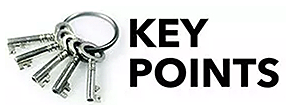
1. Nikita Khrushchev was the leader of the USSR after the death of Stalin. A veteran of the Russian Revolution and World War II, he emerged as a potential leader in the early 1950s.
2. Khrushchev had been a member of Stalin’s inner circle, however, he denounced Stalin’s tyrannical rule in 1956. He enjoyed better relations with the West, visiting the United States.
3. Khrushchev led the USSR through several key Cold War events, such as the U2 spy plane affair and the Cuban missile crisis. He was also known for his belligerent rhetoric.
4. At home, Khrushchev relaxed oppressive Stalinist controls, decentralised the economy and increased food production by opening up land and giving incentives to farmers.
5. Khrushchev’s inability to gain the upper hand over the US saw him ousted from the leadership in 1964. He went into immediate retirement, taking no further part in Soviet politics.

Krushchev’s ‘Secret Speech’ denouncing Stalinism (1956)
A transcript of the Nixon-Khrushchev ‘Kitchen Debate’ (1959)
Content on this page is © Alpha History 2018-23. This content may not be republished or distributed without permission. For more information please refer to our Terms of Use.
This page was written by Jennifer Llewellyn, Jim Southey and Steve Thompson. To reference this page, use the following citation:
J. Llewellyn et al, “The Soviet Union under Khrushchev”, Alpha History, accessed [today’s date], https://alphahistory.com/coldwar/soviet-union-under-khrushchev/.
